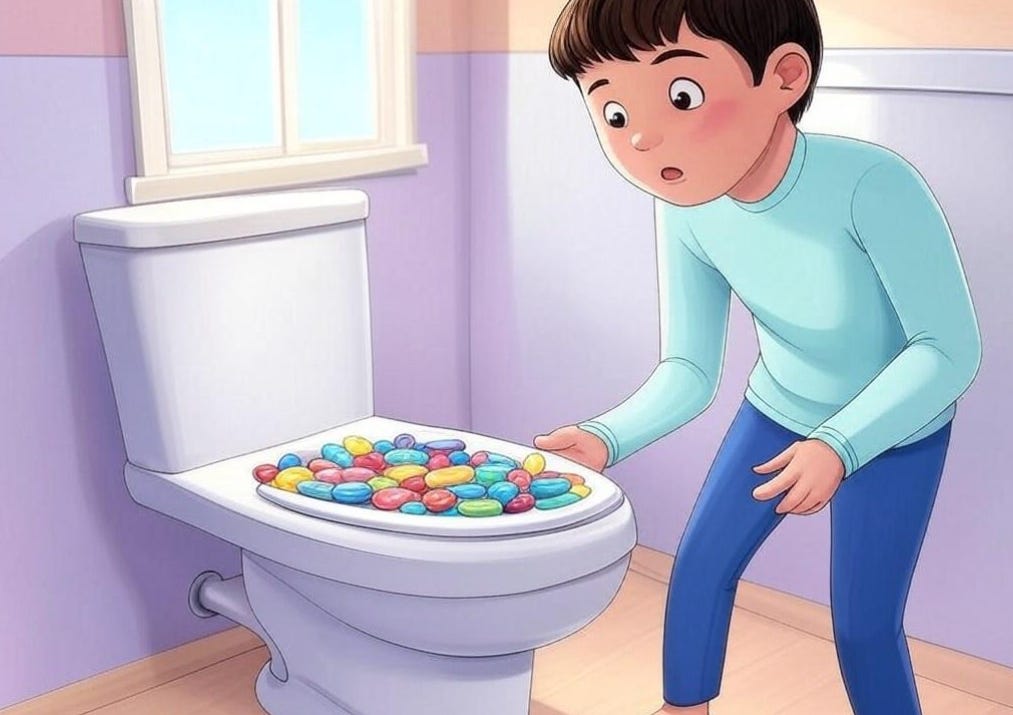The $50 Billion Question: Are Your Vitamins Just Expensive Urine?
You can thank Riboflavin for the Mellow Yellow
As I looked down at my morning coffee and the daily supplement stack I'm taking over the Christmas break, a family member of mine said, "Why do you bother taking that when it just makes really expensive pee?"
And I thought to myself: "Every one of these pills has a very specific purpose that I am trying it out for."
But I do know many people that take things just because the internet told them to, especially multivitamins. Which, as a side note, are usually full of junk and the cheapest versions of any vitamin you're looking for.
So I wanted to dig into the actual science that taking multivitamins or a whole bunch of supplements might literally just make your pee really expensive.
At Patchwork, we generally do not advise anybody takes an actual multivitamin. And if we make supplement recommendations, they come with very specific needs. They have to show the result we're looking for, otherwise we tell someone to stop.
While it's true that excess water-soluble and fat-soluble vitamins are excreted in urine, the overall value of multivitamins depends on various factors.
Let's dive in.
Nutrient Absorption and Excretion
Multivitamins can indeed lead to brightly colored urine, particularly due to B vitamins (Riboflavin in particular). However, this doesn't mean the vitamins are entirely wasted:
- Your body absorbs what it needs and excretes the excess.
- The presence of vitamins in urine doesn't negate their potential benefits before excretion.
Potential Benefits
Research on multivitamin efficacy has yielded mixed results:
- Some studies suggest benefits for certain groups, such as reduced cancer risk in men and improved memory in older adults.
- Multivitamins may help fill nutritional gaps, especially for those with poor diets or increased needs.
Limitations and Controversies
The value of multivitamins for the general population is debated:
- Several large-scale studies found no significant benefits for heart disease, cancer prevention, or overall mortality in healthy adults.
- The U.S. Preventive Services Task Force concluded there's insufficient evidence to recommend multivitamins for primary disease prevention.
Considerations for Use
Whether multivitamins are worth taking depends on individual circumstances:
- They may be beneficial for pregnant women, older adults, or those with specific nutritional deficiencies.
- For most healthy individuals eating a balanced diet, multivitamins may not provide significant additional benefits.
Expert Opinions
Views on multivitamin use vary among health professionals:
- Some experts argue that a healthy diet should provide sufficient nutrients without supplements.
- Others suggest multivitamins can serve as a nutritional "insurance policy".
Excess is fine though right?
Wrong.
Unfortunately, because of the way that scientific and nutritional knowledge is laundered through medical education, there is a shared opinion that any excess vitamins are harmless and will just be filtered out of your body.
What this view fails to appreciate is that to be filtered out of your body, it actually needs to use your liver, your kidneys, and your existing detox pathways to do so.
As I covered earlier in "Your body (fat) is polluted", most of our detox pathways and the organs that we use for filtering out toxins are overwhelmed in a modern environment.
I personally have several friends who have suffered as adults from hypervitaminosis A. Clinically speaking, this can only happen when someone takes too much vitamin A from supplementation.
But that isn't the reality. Every person I know who had a cascading health failure from having too much vitamin A in their body didn't take supplemental vitamin A or a multivitamin.
Furthermore, the science which says that excess vitamins will just be excreted from your body is decades old and doesn't apply to people in their context today.
In addition, as mentioned at the beginning of this post, the ingredients which manufacturers use to make multivitamins are not the best, most bioavailable, or high-quality forms of those vitamins.
There seems to be no regulation over how much of each vitamin should or can be put in a pill.
Conclusion
While vitamins can lead to nutrient excretion in urine, dismissing them entirely as "expensive pee" overlooks potential benefits for certain individuals.
I think taking the opinion that broad spectrum vitamins someone is taking is expensive pee is actually a healthy one.
The decision to take vitamins should be based on individual nutritional needs, and the first line of action is always to get them from food.
The second being to only try and supplement the specific vitamins that you think you need and of the highest quality.



